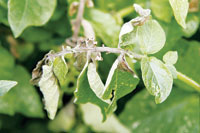New blight fungicides add to crowded market

The well-stocked potato blight fungicide market will be ever more crowded with the addition of two BASF fungicides, based on a new active ingredient, ametoctradin.
Resplend is formulated with dimethomorph, while Decabane contains mancozeb in addition to the new chemistry, which also goes under the brand name Initium.
“Ametoctradin is a highly effective protectant fungicide, which works primarily on the infective stages,” says Rob Storer, the firm’s potato product manager. “It prevents disease by inhibiting zoospore formation, release and motility and through direct effects on the germination of sporangia, and will play a useful role in preventing both foliar and tuber blight.”
Resplend is likely to be targeted more at the rapid canopy stage of potato crops, although it does still have a reasonably flexible position within programmes, he suggests. “With the dimethomorph it’s particular strength is during rapid canopy growth because of dimethomorph’s local systemic and translaminar activity enabling it to move into new growth.”
In contrast, Decabane will be positioned for use at stable canopy, he says. “Both mancozeb and ametoctradin are strong protectants.”
That puts it into direct competition with products such as Revus (mandipropamid), Infinito (propamocarb + fluopicolide), Ranman (cyazofamid) and Valbon (benthiavalicarb + mancozeb), as well as some cheaper options including Curzate M (cymoxanil + mancozeb).
Decabane sits just below the top three in terms of efficacy based on limited information, according to Barrie Florendine, potato specialist for UAP. “It is in the same sort of ballpark as Valbon. It looks like a strong protectant, but I’ve seen no data to suggest it is better than Revus or Ranman in that crowded mid-season slot.”
He expects Resplend to be useful where dimethomorph formulations have previously been used for their persistence early to mid season.
Small quantities of both new fungicides are on farm this season before a full-scale launch next season.

